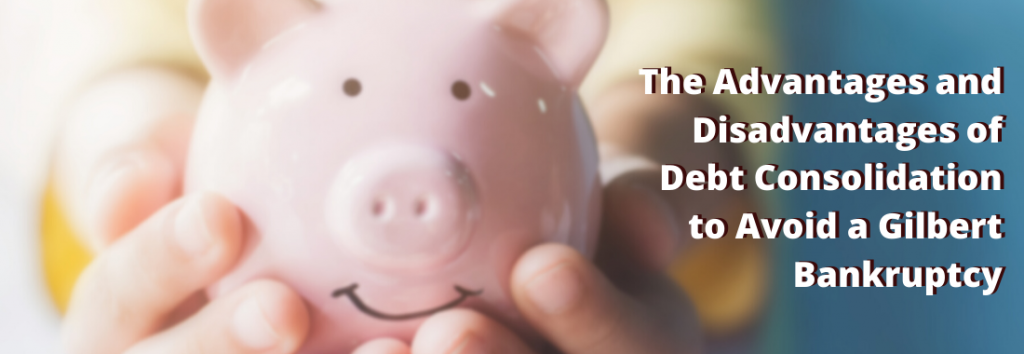The Advantages and Disadvantages of Debt Consolidation to Avoid a Gilbert Bankruptcy
Having a lot of payments each month can make your debt feel even more overwhelming. Instead of making one payment, you may have to manage 5 or even 10. Not only can that become confusing and stressful, which can cause you to miss payments, but it can also compound your debt with the individual interest rates and fees attached to each account.
Consolidating your debt can help you get a handle on your finances and pay down your debt faster. Depending on the option you choose, you could have one debt payment for far less than what you were previously paying collectively, and you could have a lower interest rate, which will save you money and help you pay off debt faster. But all of that is dependent on the type of debt consolidation method you choose. In some cases, simply filing for bankruptcy is a much better option.
It’s important that you talk with a bankruptcy attorney about the pros and cons of debt consolidation compared to filing for a Gilbert bankruptcy to help you make the right decision.
Types of Debt Consolidation
You have a few options for debt consolidation. One of the easiest things you can do is request a balance transfer on one of your credit cards. You simply move the balance from one credit card that charges high interest to another credit card that charges lower interest. You can keep doing this as often as you need to while you pay down your debt.
If you own your home and have some equity built up, you can borrow against the equity in your home. You can use that money to pay off the credit cards or other debts, changing out those high-interest debts for a much lower-interest loan.
If you don’t own a home, you may be able to get a personal loan or a debt consolidation loan with a reasonable interest rate. Know that you will either need to have a good credit score (which you likely don’t have with so much debt) to get these loans, or you’ll have to have collateral (such as a car or another item of high value).
Advantages
The primary advantage of choosing debt consolidation over bankruptcy is that you get to pay down your debts without putting a black mark on your credit. A bankruptcy discharge will stay on your credit report for 10 years, and it will bring down your credit score – unless you already have multiple late payments and revolving accounts; then bankruptcy can actually improve your score.
Each of these debt consolidation options can lower the amount you pay toward your credit cards and other accounts by giving you a better interest rate, as well. Of course, when you file for Chapter 7 bankruptcy, you can lower the amount you pay to unsecured debts to zero.
Disadvantages
There are a number of disadvantages to debt consolidation options. If you look at a credit card balance transfer, you have to be very careful about the fine print. You may get a zero percent interest rate, but that rate may reset to something outrageous after the introductory period. You may also have to pay a big fee to make the transfer. You need to watch it closely to make sure you don’t end up spending a lot of money to save money.
If you take out a home equity loan, you instantly lose that equity (since you now have debt against it) and you set yourself up for great loss. What happens if you can’t pay back the equity loan? Or if you get into even more trouble with debt? You can lose your house. Filing for bankruptcy can’t stop that from happening.
If you take out a personal loan or debt consolidation loan, you run the same risk of losing your collateral or of getting more into trouble with debt. Maybe now that you have the loan and free credit card balances, you’ll just charge more instead of paying down debt.
In many cases, the best option for dealing with overwhelming debt is to file for bankruptcy. Chapter 7 bankruptcy allows you to discharge your unsecured debt so long as you meet the means test, which looks at your income and assets. Chapter 13 bankruptcy is a reorganization plan similar to other debt consolidation strategies, except it’s based on your ability to pay and not the overall amount you owe. You may be able to discharge some of your debt, and you’ll have a limit to how long you’ll be paying (just three to five years).
It’s important that you talk to a bankruptcy lawyer about how your situation can be helped, specifically, by filing for Chapter 7 bankruptcy or Chapter 13 bankruptcy. Gilbert Bankruptcy Lawyers is ready to help if you are struggling with debt. A bankruptcy attorney from our team can review your finances with you and help you understand how bankruptcy could help you. Call us in Gilbert today to talk to a bankruptcy attorney about your options.
Published By:
Gilbert Bankruptcy Lawyers
Office: 480-448-9800
Website: https://gilbertbankruptcylawyers.com

